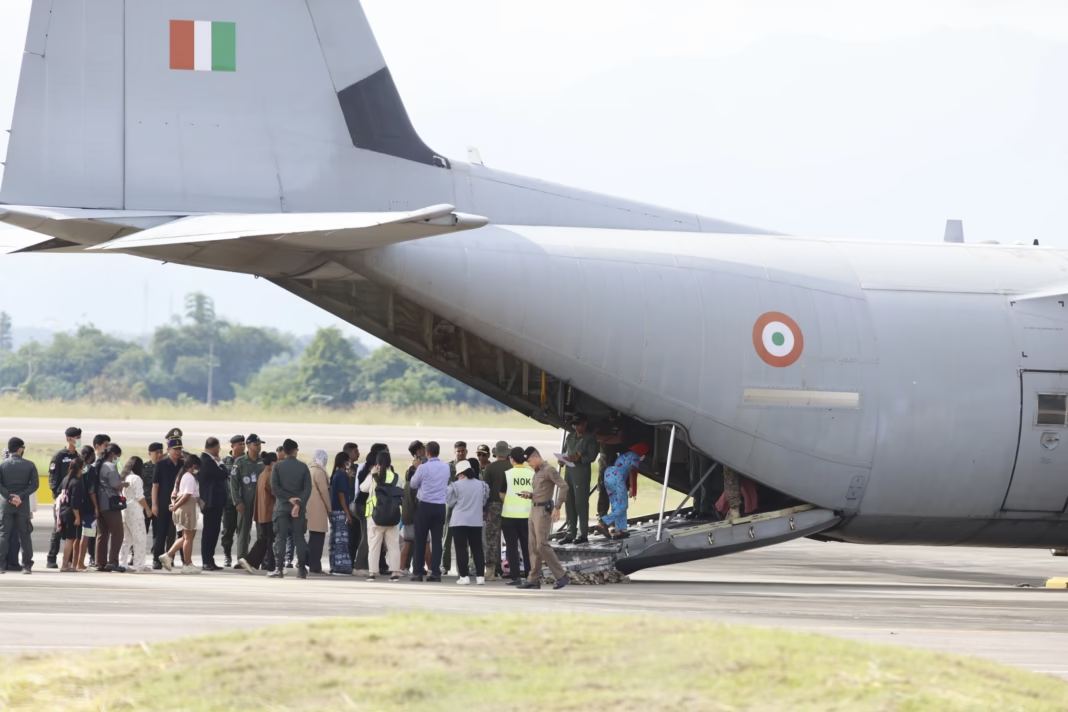YANGON / BANGKOK / NEW DELHI — Myanmar’s military government said Sunday it has demolished nearly 150 buildings at a notorious internet scam complex near the Thai border, while India began repatriating hundreds of its nationals who fled the same area after a major raid on the compound last month.
According to the junta’s state-run newspaper, The Global New Light of Myanmar, the demolition drive at the KK Park complex uncovered 148 structures, including dormitories, a four-story hospital, a gym, a spa, and a two-story karaoke lounge. Officials said 101 buildings have already been torn down, and work on the remaining 47 is underway.
The demolition follows a mid-October military raid at KK Park, located near the border town of Myawaddy, one of Southeast Asia’s most infamous cybercrime hubs. The compound housed thousands of workers — many of them trafficked from across Asia — who were forced to operate online scams and illegal gambling networks generating billions of dollars annually.
India began repatriating on Thursday the first batch of hundreds of its nationals who fled to Thailand after escaping from the scam center. An Indian Air Force transport aircraft departed from Thailand carrying about 270 of the 465 Indians scheduled for repatriation, with another flight planned later in the day. The remaining evacuees are expected to return to India next Monday, said Maj. Gen. Maitree Chupreecha, commander of Thailand’s Naresuan Task Force, which oversees the border region.
The center, known as KK Park, was raided by Myanmar’s army in mid-October as part of a coordinated effort to suppress cross-border online scams and illegal gambling. The raid prompted more than 1,500 people — including hundreds of Indian nationals — to flee across the border into Thailand seeking safety.
This marks the second major repatriation effort by India in less than a year. In March 2024, New Delhi brought home 549 citizens caught in similar cybercrime operations along the Myanmar-Thai border following a separate crackdown.
Indian officials have been coordinating closely with Thai authorities and the International Organization for Migration (IOM) to facilitate safe passage home for the rescued workers. Most of the returnees were young professionals duped with fake job offers and later forced to participate in fraudulent investment and cryptocurrency schemes.
Residents on both sides of the Myanmar–Thailand border reported hearing intermittent explosions since the military demolition began, though AFP was unable to independently verify the junta’s claims.
Analysts say the junta’s actions appear partly performative, aimed at easing international pressure — particularly from China and ASEAN countries — without fully dismantling the profitable scam industry that funds local militias allied with the regime.
“China is growing increasingly impatient with scam centers targeting Chinese citizens,” one regional analyst said. “But a full crackdown could undercut the militias and warlords the junta relies on for survival.”
In February, pressure from Beijing led to the repatriation of some 7,000 scam workers from northern Myanmar, while Thailand imposed a cross-border internet blockade to choke off illegal operations.
Following an AFP investigation revealing that KK Park continued to expand despite “raids,” using Starlink satellite receivers to bypass Thai internet restrictions, SpaceX confirmed it had cut service to over 2,500 terminals linked to suspected scam operations in Myanmar.
The ongoing demolitions and repatriations mark a rare coordinated effort among Myanmar, Thailand, India, and China to combat a regional cybercrime epidemic that has exploited tens of thousands of workers and defrauded victims worldwide.
As repatriation flights continue, Indian officials say they remain committed to rescuing more citizens trapped in similar scam compounds across Southeast Asia — and to ensuring that no one else falls prey to fake overseas job syndicates again.
SOURCE : AP NEWS | Follow Us: Facebook | Instagram | Twitter | Youtube |



